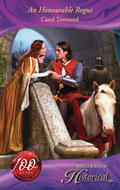Kitap dosya olarak indirilemez ancak uygulamamız üzerinden veya online olarak web sitemizden okunabilir.
Kitabı oku: «Runaway Lady, Conquering Lord»
Praise for Carol Townend
THE NOVICE BRIDE
‘THE NOVICE BRIDE is sweet, tantalising, frustrating, seductively all-consuming, deliciously provocative…I can’t go on enough about this story’s virtues. Read this book. You’ll fall in love a hundred times over.’
—Romance Junkies
‘From the very first words, this story snatches the reader from present day, willingly pulling hearts and minds back to the time of the Norman conquest. Culture clash, merciless invaders, innocence lost and freedom captured—all wonderfully highlighted in this mesmerising novel.’
—Romance Reader at Heart
AN HONOURABLE ROGUE
‘Ms Townend’s impeccable attention to detail and lush, vivid images bring this time period to life.’
—Romance Reader at Heart
‘Anyone who wants to read a very satisfying and heart-warming historical romance will not go wrong with AN HONOURABLE ROGUE by Carol Townend.’
—CataRomance
HIS CAPTIVE LADY
‘Ms Townend does an excellent job of drawing readers into the world of the Saxons and Normans with clever dialogue and descriptions of settings and emotions. I give this book a very high recommendation!’
—Romance Junkies
The sheer physical strength of the man was impressive—the wide shoulders, the muscled thighs—she had felt this for herself as he had carried her up those stairs. But there was more than mere strength here. Yes, it was most odd. It was there in his eyes…This evening Emma would swear she could put her life in his hands and rest easy.
But he is a Norman!
Pointedly, she made a show of looking about his bedchamber. It was furnished with royal extravagance. There were two braziers—comforting glimmers of heat. Adding more coals to one of them, Sir Richard waved her towards it. ‘Warm yourself, my lady.’
My lady. Tears pricked at the back of her eyes. How long had it been since anyone had done her the courtesy of addressing her by her title? But he would soon stop doing so once he learned about her son…
Carol Townend has been making up stories since she was a child. Whenever she comes across a tumbledown building, be it castle or cottage, she can’t help conjuring up the lives of the people who once lived there. Her Yorkshire forebears were friendly with the Brontë sisters. Perhaps their influence lingers…
Carol’s love of ancient and medieval history took her to London University, where she read History, and her first novel (published by Mills & Boon) won the Romantic Novelists’ Association’s New Writers’ Award. Currently she lives near Kew Gardens, with her husband and daughter. Visit her website at www.caroltownend.co.uk
Runaway Lady, Conquering Lord
Carol Townend

Author Note
In the eleventh century heraldry was in its infancy—the devices of the various noble houses did not start to develop properly until the second quarter of the twelfth century. However, flags and pennons may be seen on the Bayeux Tapestry. They were used in the Battle of Hastings to convey signals as well as to reveal identity. Count Richard of Beaumont’s crimson pennon is similar to these.
MILLS & BOON
Before you start reading, why not sign up?
Thank you for downloading this Mills & Boon book. If you want to hear about exclusive discounts, special offers and competitions, sign up to our email newsletter today!
Or simply visit
Mills & Boon emails are completely free to receive and you can unsubscribe at any time via the link in any email we send you.
To Lucy and Mike with love and much thanks for supporting historical research in la belle France
Chapter One
Winchester—1070
Emma was halfway to the wash-house just outside the city walls when the fluttering of a red pennon caught her eye. Up there, on the road that led to the downs, a squadron of Norman horse soldiers had crested the rise. With a scowl, Emma gripped little Henri’s hand. She was late, but this she had to see. Was it him? It had to be. Sir Richard of Asculf, commander of the Winchester garrison, was finally returning from campaign in the North.
Emma stared past the row of cottages and some field strips up the hill, squinting in the bright spring sun while the March wind tugged her green veil and skirts. One knight looked much the same as another in full armour, hence the importance of his pennon. And, of course, more than one knight had a red pennon. Since William of Normandy had come to wrest the crown from King Harold, Emma had seen several such. Sir Richard’s had a silver line running through it, but the conroi, or squadron, was still too far away for Emma to make out the device.
‘Mama, you are hurting my hand!’ Henri said, trying to slide his small fingers out from hers.
‘Sorry, sweetheart.’ Emma slackened her grip, but she stayed stock-still, waiting while the column drew nearer. If it was Sir Richard, and her instincts told her it was, he had been away for several months near York. The rumours were that it had been a particularly bloody campaign; already some were calling it the Harrowing of the North. Many Saxons had been put to the sword, and not just warriors—women and children had been killed, too. Murdered was perhaps a more accurate word. Some said even the ducks and pigs had been slaughtered, and the grain had been burned to ensure that anyone left standing would have neither the will nor the wherewithal to contemplate rebelling against King William. Up around York, the Saxons that had been left alive would be battling merely to survive, exactly as she was.
But Sir Richard would be all right; his kind always were. A strong, handsome face lit by a pair of penetrating grey eyes hovered at the edge of Emma’s consciousness. Sir Richard was Norman, and while he might be a friend of her sister, Cecily, he was likely as ruthless as the worst of them. Those eyes…so cold.
Anger churned in Emma’s stomach as the line of horse soldiers snaked over the rise, chain-mail gleaming like silver, shiny helmets pointing to the sky. Doubtless they were eager to return to their quarters. Everything that had gone wrong in her life was their fault, she thought, homing in on the great grey the lead knight was riding. Sir Richard had a grey destrier. If the Normans had never crossed the Narrow Sea, her life would have proceeded as it should have done. Her mother and father would still be alive, her brother, too. Lady Emma of Fulford would be happily married and Henri would be legitimate…
Normans. Apart from her mother, God rest her soul, Emma loathed them.
Yes, it was Sir Richard sure enough, that war-horse gave him away.
‘Sir Richard.’ Muttering the name as though it were a curse, Emma turned back to the river path. Sir Richard was no doubt returning to a comfortable feather bed in the castle while, thanks to the likes of him, she—Emma glanced at the wash-house that sat by the river shallows, smoke gushing through the open side—must pound linen from dawn to dusk simply to put bread in her belly.
Emma sighed. Her morning’s work lay ahead and if she wanted to eat, she had better get to it. Releasing Henri, she set about unpinning her veil and kilting up her skirts. Since daybreak, she had been dreading this moment, but there was no escaping it. Today was her turn in the river at the washing stones. No matter that the spring sunlight had little heat in it, no matter that the Itchen was colder than melt-water from an ice-field, it was her turn at the washing stones.
Aediva was already in the river up to her knees, energetically bashing a twist of linen against the stones.
‘Good morning, Aediva,’ Emma said, tugging off her boots and setting them down by a twiggy hawthorn.
“Morning, Emma.”
‘Mama, may I play with my boat?’ Henri waved a crudely shaped wooden off-cut under Emma’s nose.
‘Yes, but not until I come down to the water. Wait there.’ She pointed at the hawthorn bush. It had not yet unfurled its leaves. ‘I have to see Bertha first.’
‘Oh, Henri’s all right.’ Aediva looked up with a smile. ‘I will keep an eye on him while you collect your washing.’
At Emma’s nod, Henri skipped towards the washing stones, blond hair—just like his father’s—shining in the sun. Where was his father? Emma wondered, unable to suppress a shiver of fear. Shortly after the arrival of the Normans, Judhael had told her that he was going to take refuge in the North. Anything, Judhael had said, rather than submit to a foreign invader. Had Judhael gone north? Had he been involved in the recent fighting? Emma bit her lip. Had Judhael been killed? Emma’s love for Judhael was entirely gone; he had destroyed it in the days after the Conquest and Emma hoped—indeed, she prayed—never to see him again. But she did not wish him dead.
She smiled at the son she and Judhael had made when a Saxon king had sat on the English throne. Illegitimate or not, Henri was the light of Emma’s life. He would soon be three. She forced herself to sound cheerful. ‘Mind you stay clear of the water.’
‘Yes, Mama.’
The Winchester wash-house was a three-sided wattle-and-daub barn, open on the river side. That morning, three of the fires inside had been lit, and steam billowed out from several kettles. Bertha, who ran the wash-house, was supervising a girl stirring a frothing cauldron with a wooden paddle and a boy was lifting wood from a stack to feed the fires.
The moment Emma set eyes on Bertha, her blood ran cold. Bertha’s face, normally red from the steam and the heat of the fires, was as white as snow and the skin round her mouth was pinched and tight.
‘Bertha, are you all right—what’s happened?’
Bertha caught her breath. Her round brown eyes were small with worry and when she made a point of stepping sharply backwards, away from Emma, cold fingers touched Emma’s neck. Something terrible must have happened for Bertha to look at her like that. ‘Bertha?’
Bertha swallowed. ‘I…I am sorry, Emma. There’s no work for you today.’
‘No work?’ Several willow baskets were stacked up round the side of the wash-house, as they were every morning. A number of them were quite clearly overflowing with dirty laundry. ‘What’s that, then?’
Bertha moved behind one of the cauldrons and, ridiculous though it might be, Emma could not shake off the idea that Bertha was afraid of her. But why on earth would Bertha look at her like that?
Deep furrows appeared on Bertha’s brow. ‘I am sorry. Truly. But I have no work for you.’
Emma blinked, unable to believe what she was hearing. Bertha was a good friend, one who always made certain to save her plenty of work. ‘I don’t understand.’
‘It is quite simple. I have no work for you, not any more.’
Emma looked pointedly at the laundry baskets. ‘No?’
‘No.’ Bertha took a small step towards her. It was then that Emma noticed the bruising on Bertha’s wrist. Lord, on both her wrists. ‘I am sorry, Emma. Some old friends have returned to Winchester. I…I only have so much work to offer and they are desperate. Desperate.’ Bertha almost spat out the last word, but for the life of her, Emma could not grasp what she was being told.
Emma frowned, her eyes kept returning to those bruises. ‘Your friends have demanded work?’
‘N-no, not exactly.’ For a moment Bertha would not meet her eyes, then she looked Emma straight in the face. ‘I mean, yes, yes, they do need work.’
Bertha was hiding something. Those bruises had not been there yesterday and they were in some way connected with Bertha’s ominous change of heart. No work? She must keep calm. ‘Bertha, I need the laundry you give me. How else can I earn food for Henri and myself? I also need to pay Gytha for our lodgings at the mill.’
Bertha spread her hands. ‘There is nothing I can do. You will have to find work elsewhere.’
Emma blinked. ‘I shall come back tomorrow. Perhaps then—’
‘Don’t do that. No point.’ Colour flared on Bertha’s cheeks. ‘I won’t have work for you tomorrow, either.’
A cold fist gripped Emma’s insides. ‘No work—Bertha, you are saying…never?’
Bertha nodded. ‘That’s it, never. You will have to go elsewhere.’
Dazed, Emma walked blindly into the March sunlight and came to a dead halt just outside the wash-house. No work. Saint Swithun help her, what could she do?
Henri was jumping about on the riverbank, screaming with laughter as Aediva pulled faces at him, but their laughter seemed a long way off. Overhead, some rooks were cawing as they flew over the city walls towards the castle and the woods beyond; they, too, seemed very distant. What will become of us?
Moving as in a dream, Emma forced her legs to move. She made it as far as the riverbank, and sat down next to the hawthorn where she had left her boots and her veil. Drawing up her legs, she leaned her head on her knees.
Bertha had no work for her. What else could she do?
Minutes ago Emma had been dreading her turn in the river. She wiggled her toes; they were already blue even though she hadn’t been in the water and wasn’t likely to enter it, not today. Right now she would kill to be in the Itchen alongside Aediva. What was she going to do? However was she going to pay Gytha?
Lifting her head, Emma looked back over her shoulder. Through a gap between two cottages, a couple of ploughboys were visible, hard at work in one of the field strips. One was pulling on the ox’s halter, while his companion steadied the plough. In their wake seagulls dived and mewed. And there, past the field strips, on the road beyond was Sir Richard of Asculf, the most powerful man in the district, riding back to his garrison at the head of his squadron. A couple of wolfhounds were loping alongside him, and a small white dog she was unable to identify.
The most powerful man in the district.
They were almost back in Winchester. Richard’s conroi had crested the rise overlooking Eastgate when his shoulder gave another twinge and his fingers tightened involuntarily on Roland’s reins. It was a mere twitch, but nonetheless it had Roland tossing his head. Richard suppressed a smile. For all that Roland was such a big-boned piece of horseflesh, these years in England had seen him become highly sensitised to Richard’s slightest movement.
‘Is your shoulder paining you, sir?’ his squire, Geoffrey, asked. ‘You rode like a demon back there. We almost lost the hounds.’
‘What, are you worried you might have to re-stitch me?’ Richard said, with a grin. There had been no surgeon handy when they had removed the arrow and his squire had proved to be a little squeamish when it had come to sewing him up.
‘It seems quite possible, you ought to take more care.’
‘Geoffrey, it was only a scratch. Best to keep moving. Don’t want to seize up.’
‘No, sir.’
Richard turned his gaze back to the road. In between Richard’s squadron and the city walls a row of cottages followed the course of the river. Some lads were doing some late ploughing, scoring the earth with dark furrows. Crops were being seeded in other holdings, apples trees were being pruned.
‘The city looks idyllic from here, eh, Geoffrey, the clear skies, the bright sunlight?’
‘Aye, just like home.’
Richard shot his squire a startled glance. ‘You think so?’ Winchester would never feel like home to him. He longed to return to Normandy, but King William had ordered him to remain in Winchester and command the garrison. And, as a loyal knight, Richard would obey.
As they approached Mill Bridge the road took the conroi past the wash-house. One of the laundry women was knee-deep in the river, talking to her child as she beat linen against the rocks. Another, a young girl with a thick blonde plait, sat to one side, hunched by the riverside in an attitude of exhaustion. She must have heard their hoofbeats though, because at their approach the girl rose. Setting her hands on her hips, she stared as they rode by.
There was a certain belligerence in the girl’s stance for all that she was a slender little thing. Her feet were blue with cold. Shapely legs, what Richard could see of them. Geoffrey had seen her, too; he nodded at her as they passed, but the girl didn’t respond. Richard doubted she even saw Geoffrey for she was, he realised with something of a jolt, staring at him with that narrowed gaze he had come to recognise in many Saxon eyes. Blue eyes, gleaming with hostility. And yet behind the hostility, if he was not mistaken, there was fear, too. Such a shame. She might be pretty, if ever she lost that scowl.
Just then the boy by the riverbank gave a shriek; the hostility vanished from the girl’s face and her head whipped round.
‘My boat, my boat!’ the child wailed.
The stick he had been playing with was drifting beyond his reach. The woman in the water tried to snatch at it as it floated past, but missed.
‘Mama!’ The child’s distracted wail drew the barelegged laundry maid to his side, concern in her every line.
Shaking his head, Richard looked towards Eastgate and wondered if, after what had happened at York, Normans and Saxons would ever learn to live in peace.
Some half an hour later, when Emma had calmed Henri about the loss of his boat and the shock of losing her work had begun to ease, her green skirts were neatly back in place and her veil was securely covering her hair.
‘Gytha will help us, Henri,’ she said, pushing through the crowd on Mill Bridge.
Henri glanced up and nodded as though he understood what she was talking about. Sometimes, it seemed to Emma that Henri really did understand everything she said to him, but that was ridiculous. Her son was not yet three, how could he? She paused to smooth a stray lock of his hair back into place. There was no trace of the tears brought about by the loss of his boat, thank goodness. Henri was smiling his normal sunny smile.
Emma’s nose wrinkled. Smoke! The smell of smoke was not in itself unusual, but great acrid gouts of it were hanging over the bridge, stinging her eyes, catching in the back of her throat. Henri began to cough. Someone’s cooking fire must have got badly out of control.
‘Mama, look!’
Emma waved her hand in front of her face to clear the smoke and her jaw dropped. The mill! Some fool had set a fire in the mill yard. Gytha was running to the river with a bucket in either hand and her husband, Edwin, was tossing water onto a smoking fire set all too close to the wooden wall of the mill.
Someone yelled, ‘Fire!’
An excited babble broke out among those on the bridge, but no one was running to help. Picking up her skirts, clinging to Henri, Emma elbowed through and into the cobbled yard.
‘Here, Henri, wait by the wall.’ Eyes round, Henri stuck his thumb in his mouth and went to stand by a couple of grain sacks.
Emma raced to Gytha’s side, grasped a bucket handle and set to work. The fire was not large and a few bucketfuls later it was reduced to a hissing black mass.
‘Lucky it was small,’ Emma commented, as she, Gytha and Edwin frowned down at the smouldering remains. ‘But what fool would light a fire so close to the mill?’
Silence. Gytha was biting her lips. Edwin refused to meet her eyes. Indeed there was something in his stance that put Emma in mind of Bertha. Oh, no, what now?
‘Gytha?’
Gytha’s throat worked. She glanced at the onlookers blocking Mill Bridge and Emma followed her gaze. A great bear of a man stood in between two nuns from the nearby convent. The hood of his cloak was up, but Emma could see that he wore his brown hair and beard long, in the Saxon manner. Emma sucked in a breath; she must be dreaming, but she thought she knew him.
Azor? In Winchester?
It couldn’t be. But for a moment it was as though Emma was wrenched back four years in time to 1066. The man had a long brown beard, just like Azor’s. She must be mistaken—many Saxons wore such beards. Even as Emma looked, he ducked back into the crowd, leaving the nuns staring avidly over the handrail at the goings on at City Mill.
Gently, Gytha touched her arm. ‘Emma, you had best come inside.’
Edwin exchanged glances with his wife. ‘I’ll make sure the fire is right out,’ he said, ‘and then I’ll shift the grain sacks ready for the carter.’
Usually when in the mill, Emma found the familiar rattle and rumble of the mill wheel calming, but today it seemed too loud. Perhaps because her nerves were jangling even the rush of the river under their feet seemed deafening.
‘Was that Azor on the bridge, Gytha?’
Gytha made her way to the hopper and scooped in some grain. Henri followed, settled himself on the floor by Gytha’s skirts, and began drawing patterns in the flour dust.
‘Gytha?’
Briefly, Gytha closed her eyes. ‘Yes, that was Azor.’
Emma felt as though the mill had been tipped upside down. Azor was Judhael’s most staunch supporter; he was also another champion of the lost Saxon cause. ‘Sweet Mother.’ Mouth dry, she swallowed hard. ‘Does that mean that Judhael has returned?’
‘I am afraid so.’
Emma’s nails dug into her palms. ‘You have seen him?’
‘Yes.’
‘Oh, Lord.’ Emma drew a shaky breath. ‘You spoke to him?’
‘Yes.’
‘And…?’
Gytha smiled sadly at Henri and shook her head. ‘It doesn’t matter what he said. I think you should forget it.’
‘He is still bitter? He knows that I live here?’
‘Yes to both questions,’ Gytha said.
Emma felt the blood drain from her face. ‘I thought I could escape him here, that I would be safe among all these people. If I had gone back to Fulford, Judhael would have found me in a moment. How did he find me?’
Gytha lifted her shoulders, her eyes were wide and concerned. ‘I have no idea, but it wouldn’t take much to discover your whereabouts. A question here, a question there.’
‘I have prayed and prayed that he would never come back.’
‘Well, Judhael and Azor have both returned and somehow Judhael has learned that you live here.’
‘Gytha, he said something else, didn’t he?’
Gytha dropped the grain scoop back into the sack and dusted down her hands.
‘Gytha?’
Gytha pursed her lips and something clicked in Emma’s mind. Crossing the floor in two strides, she took Gytha’s arms and looked at her wrists. Mercifully, they were unmarked. ‘He threatened you, didn’t he? And Bertha—Judhael must have been to see her, too.’ She scrubbed at her forehead. ‘What was it Bertha said—something about desperate friends having returned…?’
‘Emma, what are you talking about?’
‘Judhael! He must have threatened Bertha, which is why she has stopped giving me work—’
‘Bertha had no work for you?’
‘Apparently not. There were several baskets of linen lined up to be washed, but I wasn’t allowed near them. Judhael must have paid her a visit, don’t you see?’
‘I am beginning to. He certainly wants you back.’
‘The man is mad! After what he did up at SevenWells Hill, the way he beat Lufu when he learned it was she who told Cecily the location of the rebel camp. Lufu was only trying to help get my baby brother to safety.’ Cold sweat was trickling down Emma’s back. She looked at her son, at Judhael’s son. If Judhael got hold of Henri—It didn’t bear thinking about. ‘I’ll never go back to him, never!’
‘Of course not. Never fear, we shall pay him no mind. We managed to put out the fire and—’
Emma’s blood turned to ice. ‘Judhael set the fire?’
‘We are not sure, but it seems likely. It happened shortly after his visit. I think it is meant as a warning. He suggested we throw you out.’ Gytha grimaced. ‘Lord, I hadn’t meant to tell you that. Emma, we shall pay him no mind.’
‘Pay him no mind? Gytha, the man tries to burn down the mill and you say pay him no mind! What if he had set the fire at night and no one noticed until it was too late? We might have been fried in our beds!’
‘Hush, Emma, you are alarming Henri. And anyway, no one was hurt.’
‘Henri and I shall have to leave.’
‘Nonsense, that is exactly what he wants!’
‘What do you mean?’
‘Judhael wants you back.’
‘If he thinks threatening my friends is going to make me go back to him, then the war with the Normans had damaged him more than I realised.’ She sucked in a breath. ‘Do you think he knows about Henri?’
Gytha shook her head. ‘I doubt it, he didn’t mention him.’
‘That at least is one mercy. But I won’t have him threatening you. God help us. I like being here with you and Henri does, too. Don’t you, Henri?’
‘Yes, Mama.’
‘Emma, it isn’t right that Judhael should be threatening you. You are a lady—’
‘Not any more I’m not.’
‘Yes, you are. Your father was Thane of Fulford. Judhael was only a housecarl.’
Emma sighed. ‘Be that as it may, I won’t bring trouble to your door. Henri and I must leave.’ ‘Judhael said he would return tomorrow.’
‘I shall be gone by then.’
‘You can’t go to Fulford.’
‘No, I can’t, Judhael is doubtless waiting for me to do just that.’
‘Where then? Where will you go?’
Ücretsiz ön izlemeyi tamamladınız.





